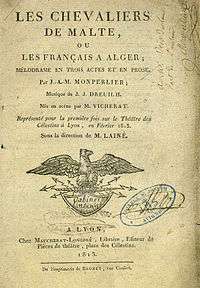Jean-Antoine-Marie Monperlier
Jean-Antoine-Marie Monperlier, (31 June 1788 – 23 March 1819) was a French poet, playwright, and librettist. Monperlier was born in Lyon. His plays ranged from light vaudeville to larger scale melodramas, often incorporating ballet sequences. His play Les chevaliers de Malte formed the basis for Giacomo Meyerbeer's 1824 opera Il crociato in Egitto. He died in Paris, aged 30.

Cover of Monperlier's Les chevaliers de Malte, first performed in 1813
Works
Monperlier's dramatic works include:
- Les femmes infidelles – opéra-vaudeville in 3 acts, first performed 22 September 1812
- Le joueur de flûte, ou Les effets de l'harmonie – opéra comique in 1 act (libretto by Monperlier, music by Jean-Jacques Dreuilh), first performed 5 January 1813
- Les chevaliers de Malte, ou, L'ambassade a Alger – mélodrame in 3 acts, first performed February 1813
- Almanza, ou, La prise de grenade – mélodrame héroïque in 3 acts, first performed 23 July 1814
- Le prince et le soldat – mélodrame in 3 acts, first performed 29 November 1814
- Le panier de cerises – vaudeville anecdotique in 1 act, first performed 17 May 1817
His poetry includes:
- Poèmes et poésies fugitives: voyage au Mont Cindre – published by Chambert, Lyon, 1812
- L'ombre de Henri IV (ode) – published by Chambert, Lyon, 1814
- Le retour des Bourbons – published by Chez les marchands de nouveautés, Paris, 1815
Sources
- Bréghot du Lut, Claude and Péricaud, Marc Antoine, "Monperlier (Jean-Antoine-Marie)", Biographie lyonnaise, Giberton et Brun, 1839, p. 195.
- Le Tellier, Robert Ignatius, The operas of Giacomo Meyerbeer, Fairleigh Dickinson Univ Press, 2006, p. 88. ISBN 0-8386-4093-1
- WorldCat, Jean Antoine Marie Monperlier. Accessed 22 September 2009.
gollark: That sounds extremely horrible and broken.
gollark: It would probably also encourage overstating R&D costs, or just randomly introducing waste so they're larger.
gollark: How would you measure that?
gollark: Also, it would probably make the concept pretty meaningless, since arguably... a patent for any new thing would give you a monopoly on that new thing.
gollark: Hmm. I'm not really sure what you would do about that, then. Although it wouldn't be fixed by somehow banning patenting on medical research either.
This article is issued from Wikipedia. The text is licensed under Creative Commons - Attribution - Sharealike. Additional terms may apply for the media files.